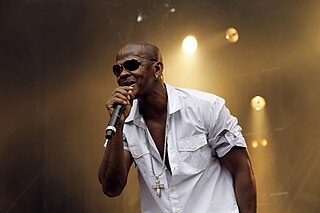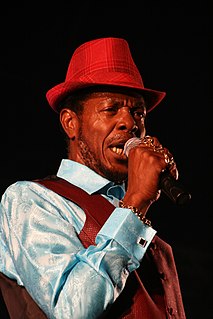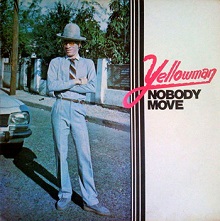
Anthony Moses Davis, better known by his stage name Beenie Man, is a Jamaican reggae and dancehall singer. He is referred to as the world's "King of Dancehall".

Rodney Basil Price, known as Bounty Killer, is a Jamaican reggae and dancehall deejay. AllMusic describes him as having been "one of the most aggressive dancehall stars of the '90s, a street-tough rude boy with an unrepentant flair for gun talk". He is the founder of a dancehall collective known as The Alliance with deejay Mavado and Vybz Kartel

Wayne Smith was a Jamaican reggae and dancehall musician best known for his 1985 hit "Under Mi Sleng Teng", which is regarded as the track which initiated the digital era of reggae.
Duppy is a word of African origin commonly used in Jamaica meaning ghost or spirit. The word is sometimes spelled duffy.

VP Records is an independent record label in Queens, New York. The label is known for releasing music by notable artists in reggae, dancehall and soca.

Freedom Blues is the third album from Jamaican reggae musician Jah Cure. It was released in 2005 and includes contributions from Sizzla.

Clifford Smith, better known as Mr. Vegas, is a Jamaican dancehall musician.

Michael George Haynes, known professionally as Michael Prophet, was a Jamaican roots reggae singer known for his "crying" tenor vocal style, whose recording career began in 1977. Michael, who died of cancer aged 60, was one of Jamaica’s most popular roots reggae singers and had several prominent hits during his 40-year career. Prophet’s distinctive voice – he had a wide vocal range with an unusual "crying" tenor style – and the success of songs such as Gunman (1981) meant that his energetic live performances were in high demand on the international festival circuit. He was still singing live – and with gusto – in the last months of his life, Michael performed his final shows in September and October of 2017: Mekudeshet Fesitval, Jerusalem, Dub Club @Echoplex, LA, Music Box, San Diego. He was born Michael George Haynes in Kingston, Jamaica, on 3 March 1957, the only child of Caroline Smith, a housewife, and Lloyd Haynes, a painter and decorator who worked for the beverage company Desnoes & Geddes.

Ernie Smith is a reggae singer, with a deep baritone voice, who had his greatest success in the late 1960s and 1970s.
Johnny Ringo was a reggae/dancehall deejay active from the late 1970s to the early 1990s.
Purpleman, aka Peter Yellow, is a Jamaican dancehall deejay. Being one of three albino deejays in the 1980s, he often called himself Yellowman, and even released an album as him.
Fathead was a dancehall deejay best known for his collaborations with Yellowman in the early 1980s.
Cecil Wellington (1957–1996), better known as Nicodemus, was a Jamaican reggae deejay who released a string of albums in the 1980s and 1990s. Nicodemus was a pioneer of dancehall music and is credited with positively influencing many aspiring DJ's. He is truly a dancehall legend. Partnering with the iconic Super Cat since the late-1970s, the dynamic duo released a string of local and commercially successful reggae hits. Hit songs that spring to mind are "Cabin Stabbin'" and "My Prerogative. " Nicodemus died on August 26, 1996 of complications with diabetes.

"You Don't Love Me" is a rhythm and blues-influenced blues song recorded by American musician Willie Cobbs in 1960. Adapted from Bo Diddley's 1959 song "She's Fine She's Mine", it is Cobbs' best-known song and features a guitar figure and melody that has appealed to musicians in several genres.

Cleveland Laing, better known as Lieutenant Stitchie, is a Jamaican deejay who originally worked in the dancehall style but switched to gospel reggae in 1997 after surviving a car crash, thereafter working under the shorter name Stitchie.
Latin Rhythm Albums is a record chart published by Billboard magazine. Like all Billboard album charts, the chart is based on sales, which are compiled by Nielsen SoundScan based on sales data from merchants representing more than 90 percent of the U.S. music retail market. The sample includes sales at music stores, the music departments of electronics and department stores, direct-to-consumer transactions, and Internet sales of physical albums or digital downloads. A limited array of verifiable sales from concert venues is also tabulated. The chart is composed of studio, live, and compilation releases by Latin artists performing in the Latin hip hop, urban, dance and reggaeton, the most popular Latin Rhythm music genres. It joins the main Latin Albums chart along with its respective genre components: the Latin Pop Albums, Tropical Albums, and Regional Mexican Albums charts.

Winston Foster, better known by the stage name Yellowman, is a Jamaican reggae and dancehall deejay, also known as King Yellowman. He was popular in Jamaica in the 1980s, coming to prominence with a series of singles that established his reputation.

Freddie McGregor has been variously a singer, musician and producer. His music career began when he was seven years old.

Nobody Move is an album by Jamaican dancehall deejay Yellowman, released by Volcano Records in 1983. It was released in a slightly altered form outside Jamaica in 1984 as Nobody Move Nobody Get Hurt.
Urbano music or Latin urban is an umbrella term. It is used in a manner similar to other umbrella terms such as Tropical music, Regional Mexican and Latin music, to denote and group a variety of musical styles under a generic term. As an umbrella term, It includes reggaeton, Latin hip hop, Latin trap, Rio Funk, dancehall, dembow, and urban champeta. The commercial breakthrough of different genres of latin urban music have been ongoing in several stages since the late 1990s, with 2004's Reggaeton hit Gasolina and the latest global resurgence of Reggaeton and emergence of Latin trap in 2017. Artists in the style collaborate transnationally, and may originate from the United States including Puerto Rico in particular, Colombia, Cuba, the Dominican Republic, Panama, Venezuela or other Spanish-speaking nations, as well as Portuguese-speaking Brazil.













